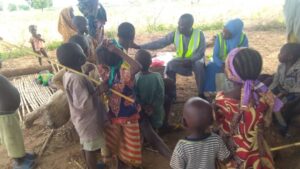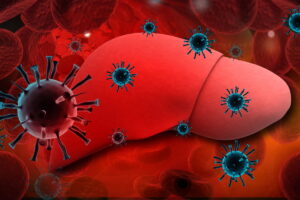The Centre for HIV/AIDS and STD Research (CHISTRE) was established in 2001 amidst a devastating health crisis in Mgbala Agwa, a rural community in Imo State with a population of 250,000. Despite its fertile lands and resilient culture, the community grappled with poverty, weak infrastructure, and fragile health systems.
That year, a surge in deaths over 35 within just three months—shocked the community, especially as most victims were young people. With 15 deaths occurring in a single month, fear and superstition took hold; elders turned to rituals for answers while stigma and misinformation fueled the crisis.
Educating Secondary school girls in Bauchi on Hygiene and HBV.
It was during Easter that year that Nduka Ozor, later the Executive Director of CHISTRE, recognized the symptoms as HIV/AIDS. At the time, youth HIV prevalence was estimated at 12%, significantly higher than the national average of 5.8%, and teenage pregnancies were widespread, with many girls having their first child by age 16. Confronted with hostility and ignorance, Nduka mobilized the youth under the Mgbala Agwa Youth Forum, which eventually evolved into CHISTRE.
In the days of superstition we sought answers from the gods. Today we seek answers from knowledge and the growth of CHISTRE has led us there.
With support from UNDP’s Netaid program and international volunteers, the organization gathered vital educational resources, establishing one of Nigeria’s first rural HIV/AIDS libraries at the community health center. This library became a cornerstone of learning and advocacy, fueling the launch of school HIV clubs, church awareness programs, and market-place campaigns.
In its first year alone, over 10,000 condoms were distributed, and 3,500 youths received direct HIV education. These initiatives led to tangible results: teenage pregnancies decreased by 40% within six months, and HIV prevalence among youths dropped from 12% to 7% over three years. Correspondingly, deaths declined from over 30 annually in early 2001 to fewer than 10 by 2004.
FROM MGBALA AGWA TO NORTHERN NIGERIA
CHISTRE’s mission later expanded to Bauchi State in Northeast Nigeria, where a silent epidemic of viral Hepatitis was ravaging young people. Reports showed over 20% of those aged 20–36 were infected, and in some villages, 4 in 10 tested positive for Hepatitis B. Health services were almost non-existent, vaccines rare, and infections often mistaken for curses or spirits.
Despite skepticism due to ethnic and religious differences, Nduka persisted, educating communities and lobbying the Presidential Committee on the Northeast Initiative (PCNI) for support. With limited resources, CHISTRE provided vaccinations to uninfected populations and raised awareness in remote villages.
Later, under the Global Fund’s GC7 project, CHISTRE was recruited as a community-based organization for active TB case finding. Teams traveled to hard-to-reach villages, collecting sputum samples, referring positive cases, and advocating for improved health access. Many villages with thousands of people had no health center; in some cases, mothers walked 30km with children on their backs, only to arrive too late.
This experience shaped CHISTRE’s “Bridging the Health Gap” approach—moving beyond HIV, TB, or Hepatitis in isolation, to addressing the broader inequities of a broken health system. Each round of vaccinations, each TB test kit, and each hour of education proved that change was possible, dignity could be restored, and needless deaths could be prevented.
From its beginnings in Mgbala Agwa to its expansion in Northern Nigeria, CHISTRE has evolved from a grassroots youth movement into a nationally recognized institution—dedicated not just to fighting diseases, but to advancing equity, justice, and the human right to health.
Every success, from reducing HIV prevalence in Mgbala Agwa to active TB case finding in Northern Nigeria, is a direct result of effective partnerships. We invite organizations and individuals who share our vision to join us in scaling these proven interventions to bridge the health equity gap for every Nigerian community.




